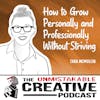Best of 2022: Tara McMullin | How to Grow Personally and Professionally Without Striving

Tara McMullin shares a refreshingly grounded antidote to our culture's relentless pursuit of more.
Subscribe for ad-free interviews and bonus episodes https://plus.acast.com/s/the-unmistakable-creative-podcast.
Hosted on Acast. See acast.com/privacy for more information.
Candid Conversations: Elevate Your Thinking with Masters of Their Craft
Dive into a realm of transformative conversations, where wisdom from trailblazers who've shattered norms is at your fingertips. Learn from best-selling authors who've decoded productivity, and thought leaders who've sculpted the landscape of personal and professional growth. Unearth the secrets of successful entrepreneurs, delve into the science of habits, and explore the art of charisma. Each conversation is a journey, brimming with unexpected insights and practical wisdom that will ignite you











